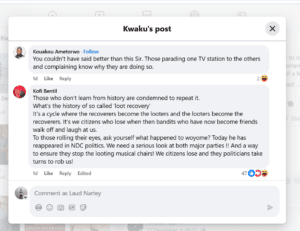Private legal practitioner Kofi Bentil has raised concerns that Ghana’s current loot recovery initiatives may fall into a repetitive cycle unless guided by historical lessons.
Bentil argued that those who fail to learn from history are doomed to repeat it, pointing out that past efforts to recover looted state assets often result in the looters becoming the “recoverers” and vice versa.
In a Facebook post responding to U.S.-based Professor Kwaku Asare’s call for an unwavering commitment to loot recovery, Bentil warned that citizens ultimately suffer when corrupt political figures, once labeled as “bandits,” are allowed to reenter the political scene. He cited the reappearance of Alfred Woyome in NDC politics as an example of how corruption cycles persist. He called for both major political parties to reflect on the issue and put an end to the “musical chairs” of looting, which he believes allows politicians to take turns exploiting the country’s resources at the expense of the people.
Professor Asare, who also commented on the importance of loot recovery for national development, echoed Bentil’s concern for accountability, adding that the effort should be driven by transparency and a firm commitment to justice. Asare emphasized that recovering looted assets is not only a moral obligation but also a strategic move to rebuild public trust, improve governance, and ensure resources are used for the collective benefit, rather than enriching a few individuals. He also stated that those who have not participated in corruption should have nothing to fear from these efforts, while those responsible for looting should be prepared to face the consequences.
In line with these calls, President-elect John Dramani Mahama has launched Operation Recover All Loots (ORAL), a task force intended to gather information from the public regarding suspected corruption. Samuel Okudzeto Ablakwa, the chair of ORAL, has made it clear that the team’s role will end once an Attorney-General is appointed, approved by Parliament, and sworn into office. The team will then forward the collected evidence to the Attorney-General for legal action.
However, the establishment of ORAL has sparked criticism from various quarters. Martin Kpebu, a member of the ORAL team, stated that the committee’s responsibility is solely to gather evidence, not conduct investigations. Once the necessary legal frameworks are set up, the team will cease to function, he said.
Vincent Ekow Assafuah, a member of Parliament for Old Tafo, criticized the ORAL team for making unsubstantiated allegations of corruption. He accused the committee of politicizing the issue and potentially damaging the reputations of innocent individuals. Assafuah also challenged the legal foundation of the ORAL committee, describing it as an unconstitutional body with no investigative or prosecutorial powers. He argued that institutions like the Economic and Organized Crime Office (EOCO), the Office of the Special Prosecutor (OSP), and the Commission on Human Rights and Administrative Justice (CHRAJ) are better suited to handle anti-corruption matters.
Mary Addah, Executive Director of the Ghana Integrity Initiative (GII), also voiced her concerns, describing ORAL as a populist measure aimed at appeasing the public rather than addressing the root causes of corruption. Addah suggested that Mahama’s government should have directed the public to report their concerns directly to established state institutions, rather than forming a new, unregulated body. She pointed to the failure of similar committees formed under the previous administration, arguing that Ghana’s democratic institutions should be strengthened rather than bypassed.
In response to the criticism, President-elect Mahama clarified that ORAL was not intended to investigate individuals. He explained that the team would serve as a focal point for gathering evidence of corruption, which would then be handed over to the appropriate legal authorities. Mahama stressed that the team would not receive any payment or operate on a budget, with the sole goal of compiling evidence for further action once his administration takes office.
As the debate continues, questions remain about the effectiveness and legality of ORAL, with some critics fearing that it may be another politically motivated attempt to address corruption without addressing its root causes.
Send your news stories to newsghana101@gmail.com
Follow News Ghana on Google News

















